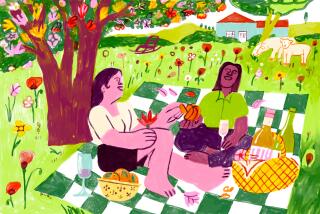Water proof
- Share via
If L.A. tap water can win an international taste test, why can’t it get any respect? Maybe, in part, because the stuff that pours into your sink at home isn’t exactly the same as that tested in Berkeley Springs, W.Va., last weekend.
The Metropolitan Water District, not L.A., won the 18th annual Berkeley Springs International Water Testing. The water sipped by the festival’s “watermaster” came from an MWD processing plant before it was sent to the Los Angeles Department of Water and Power, where it would have been mixed with water from other sources and further processed before being piped to homes. And oh, the extra bouquet some of those pipes add!
You’d expect people who put on a water festival to know the difference between water wholesalers and retailers, and between Southern California and L.A. Still, L.A.’s municipal water -- from actual taps -- has won its share of accolades over the years. More than 20 years ago, Consumers Union rated it as good as many bottled waters. In 2006, even New York magazine had to conclude, after a blind tasting, that L.A.’s water was best among several big-city contenders.
It’s hard to know whether consumers tend to like bottled water because of the actual taste or what they imagine the taste to be. Our desire not to think we’re idiots gives us a powerful incentive to believe we didn’t just blow $1.35 on something we could have had for a couple of cents. That’s so even when we’re aware that plastic bottles leave a carbon footprint and clutter landfills. The flow of bottled water couldn’t even be slowed by a 1999 report by the Natural Resources Defense Council showing that one-third of the bottled water it tested contained levels of contamination above government or industry standards. Many brands of bottled water come from the same municipal water plants that serve our homes. It would be easy enough to add a home water filter and bottle it ourselves -- right at the source, the kitchen sink.
The world might taste a little different to Californians next January, when a new law takes effect that requires water bottlers to list the source of their water on the label and to direct consumers to a website that provides information on the quality of the water. Just like the water connoisseurs at these contests (who, wonderful to say, use water crackers to cleanse the palate between gulps), consumers of bottled water have been tasting blind all these years.
More to Read
Inside the business of entertainment
The Wide Shot brings you news, analysis and insights on everything from streaming wars to production — and what it all means for the future.
You may occasionally receive promotional content from the Los Angeles Times.










